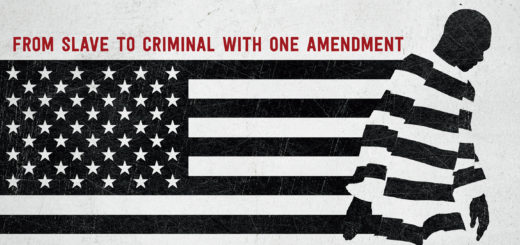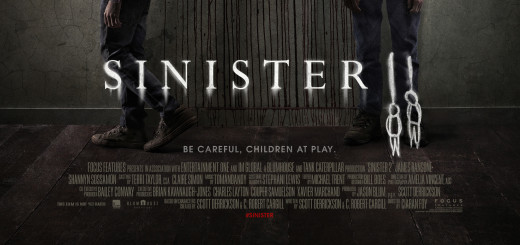HUSH Review
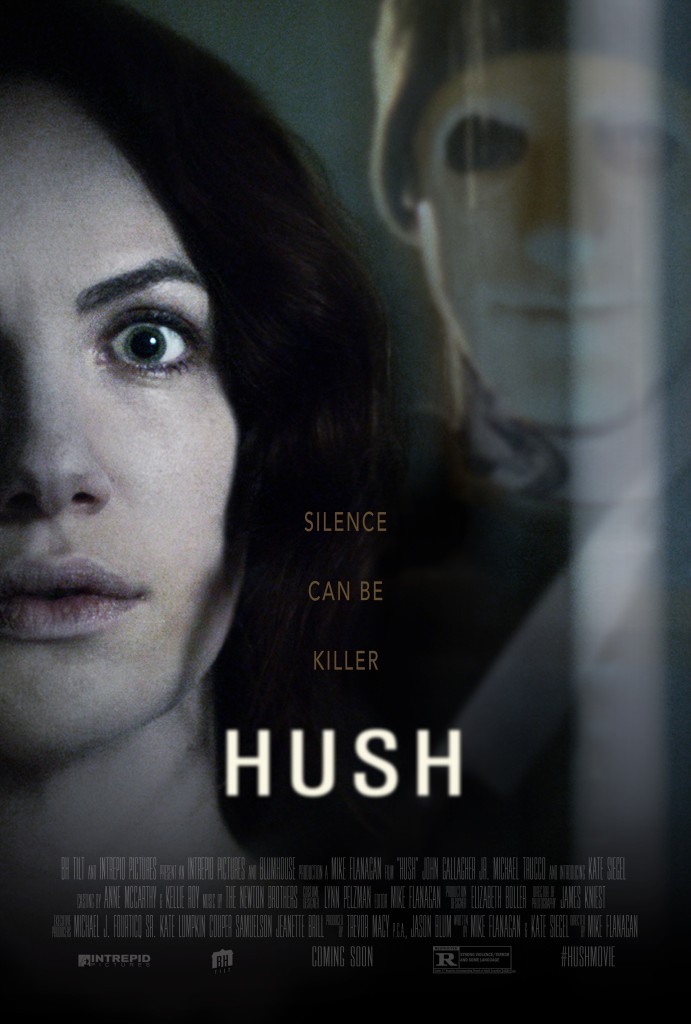
Director: Mike Flanagan
Genre: Thriller, Horror
Year: 2016
The third film from the director of the rather underrated OCULUS, Mike Flanagan’s HUSH is Netflix’s current “buzz-y” horror film thanks to its wickedly fast turnaround from SXSW to instant streaming services. And, by all accounts, I can see why. Coming in at an extremely economical 81 minutes, HUSH feels like the kind of film that would grip any festivalgoer attending the midnight circuit. However, removed from the communal sphere of influence in which excitement is occasionally transmitted by proxy, HUSH can’t escape feeling less consequential than many have purported it to be. HUSH takes a great concept and makes it good, existing as a fun cinematic snack that will entertain for its scant runtime, if not stick around in the mind of its audience members for much longer.
The “great concept” in question is the fact that Maddie, HUSH’s protagonist, is a deaf-mute writer living alone in the woods. Although perhaps raising some questions in the line of “What in Christ’s name are you doing living alone in the woods as a deaf-mute???”, it’s hard to claim that this is anything less than a stellar set up for a horror thriller. Considering that the film is barely longer than most college lectures, Flanagan wastes no time in getting the ball rolling in terms of conflict. Although we have to sit through an opening that unfortunately proves that even a film starring a deaf-mute protagonist can’t avoid the poor dialogue that permeates the genre, Maddie’s most immediate neighbor is brutally stabbed against her window by the assailant while she putters in the kitchen, entirely oblivious (one of the film’s best scenes), in the first 13 minutes, and the power is cut before we have to sit through more sign language Skype calls with her best friend Max soon after. At that point, it’s pretty much off to the races, with the killer using the neighbor’s spare key to enter the house and let Maddie know that she shouldn’t plan on seeing tomorrow.
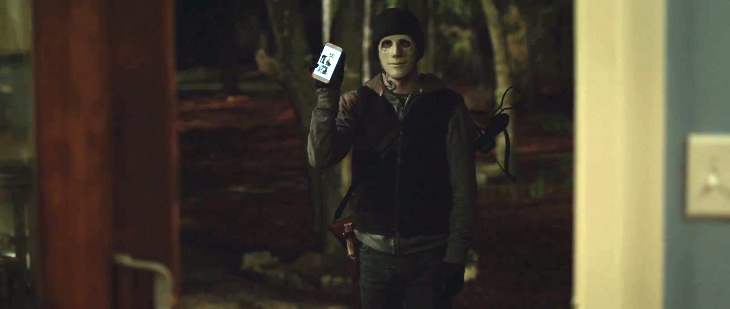
“Is your WiFi network ‘FBI Surveillance Van’?”
One 60-minute cat-and-mouse game from there on out, HUSH is at its best when it lets Maddie’s predicament subtly sink in. There was no need for Maddie’s consciousness to occasionally appear as a vision and verbally chew over the situation she’s in, thereby entirely squandering the point of having a deaf-mute horror protagonist, but scenes such as one where Maddie sets off a car alarm as a possible distraction, only to be unable to hear the killer shut off the car alarm and rapidly approach the window she’s escaping from, pack the appropriate amount of “oh, shit” punch. In general, the film’s biggest trump card is the fact that Maddie is more-or-less entirely unaware of the killer’s whereabouts at any time; while this contributes to a general atmosphere of dramatic irony that will keep the audience on edge, it also begs the question as to why there weren’t more jump scares employed, considering that Maddie would be just as unprepared as the audience, if not more so. But, a modern horror film certainly shouldn’t be criticized for not having enough jump scares, so HUSH can’t be written off on those ground by any means.
As for the killer, although it certainly isn’t as innovative of a plot point as it once was, the fact that he’s never given a name or a motive is effective. In addition, he is given one definitively chilling moment: Maddie hurriedly writes a message in lipstick on the window saying that she hasn’t seen his face and that he can leave without killing her, only to have him lift off his face and smile in at her. Although not quite as ramshot and unorganized as the killers from YOU’RE NEXT, the killer makes enough small blunders that we always believe that Maddie could escape, keeping us invested as audience members. However, especially considering the fact that without his mask he appears as a workingman’s rendition of one of the lesser Affleck siblings, HUSH loses almost all of its horror credibility and becomes an unadulterated thriller just barely into its second act. However, although this will frustrate more traditionalist horror fans, it also takes away from the self-serving gravitas many genre examples try to forcibly inject, allowing for less somber affairs such as the surprisingly rewarding, semi-comedic scene wherein John, the dead neighbor’s husband, arrives and the killer must bluff his way through pretending to be a cop.
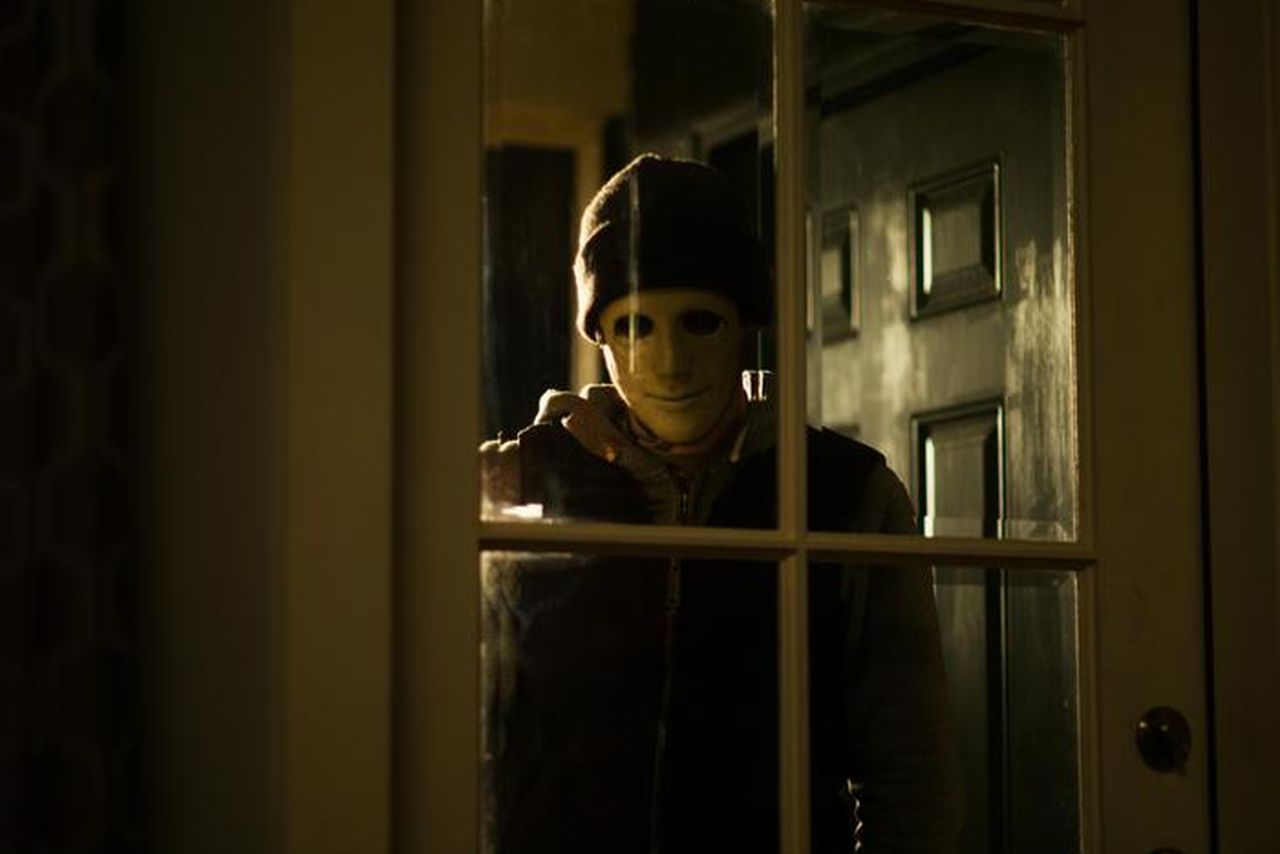
Seems legit
HUSH only makes the occasional blunder that is unjustifiable. As you’ve probably picked up on by now, it is the rare horror film that knows how to end without a disappointing third act, and the increasing presence of speaking-Maddie as she loses blood certainly toes the line in terms of HUSH. In addition, Maddie tempts the killer into a final battle by calling him a coward, which is just about as lazy as writing can get, nevermind the fact that it would take only the most sensitive of individuals to be made so requisitely mad as to proclaim that the final straw. Seriously, just “coward”? More minor complaints revolve mostly around the brief exposure we have to Maddie as a writer, which consists mostly of her getting frustrated and typing such evocative prose as “la la la. blah blah blah. ending stuff. THE END. money now please.” On a technical level, the overproduced shine and veneer of Blumhouse productions doesn’t quite suit what could have very easily been a gritty indie feature, but that comes down to a matter of personal preference, I suppose.
HUSH is consistently tense and features a handful of scenes that make full, visceral use of the protagonist’s physical shortcomings to increase the personal terror of her situation. However, apart from concept alone, it never innovates, simply feeling more like an easily consumable slasher than many of its rave reviews would suggest. Qualifiers are every self-fashioned critic’s worst nightmare, but for a film like this, they feel necessary. HUSH is “very good” for Blumhouse. HUSH is “pretty good” for Netflix horror. HUSH is “good” for a film. With two above-average features under his belt, we’ll see if Mike Flanagan can bring the same “good” to the upcoming OUIJA 2.
Verdict: Recommend

